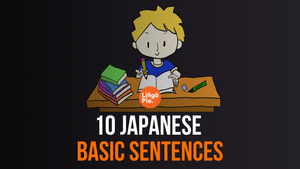Alice in Borderland is a popular Japanese TV series set in a dystopian Tokyo. The show follows a group of young people trapped in an alternate reality where they must compete in deadly games to survive.
Watching Alice in Borderland allows language learners to immerse themselves in the Japanese language and culture. We’ll explore the use of TV shows for language learning and explore how Alice in Borderland serves as a fantastic Japanese learning tool.
With a focus on vocabulary, grammar, and the language skills of listening, reading, writing, and speaking, let’s break down how to use Alice in Borderland as a language-learning resource.
Head over to Lingopie for more great Japanese-language shows to help you learn.

Introducing Alice in Borderland

Alice in Borderland is a thrilling Japanese show in which lead characters, Arisu, Karube, and Chota, find themselves trapped in a deserted city where an epic witch hunt turns their lives upside down.
To survive, they must navigate a cruel game with the game clock ticking against them. As they face their uncertain future, the deadly game poses life-or-death challenges, testing their wit, courage, and bonds.
Alice in Borderland captivates viewers with its intense storyline, high-stakes gameplay, and the constant danger that looms over the characters' every move. And beyond its entertainment value, Alice in Borderland provides a fascinating window into Japanese culture and society.
When the epic witch hunt turns into a deadly game, the series explores themes of survival, morality, and human nature. This offers watchers an insight into the values, aspirations, and challenges faced by contemporary Japanese youths.
By delving into these cultural nuances, language learners can deepen their understanding of Japanese society while improving their language skills.
Alice in Borderland's character development and cultural relevance make it ideal for language learners seeking an engaging and immersive experience in their Japanese language journey.
Why Use TV Shows for Learning Japanese
Using TV as a tool for language learning offers numerous benefits that make the learning experience engaging and enjoyable.
Firstly, it provides learners with an immersive experience that brings them closer to the target language's cultural context, allowing for a deeper understanding of customs, traditions, and societal norms.
Moreover, TV shows expose learners to authentic Japanese language usage, expanding their vocabulary and enabling them to grasp colloquial expressions and idiomatic phrases.
Through exposure to various accents and speech patterns found in Japanese-language media, learners develop a better ear for understanding different forms of spoken language.
Additionally, engaging with TV shows and movies aids in building listening comprehension skills. Learners can hone their ability to understand spoken language in real-life contexts, improving their overall language proficiency.
By incorporating pop culture into language learning, Japanese-language students gain a multifaceted and dynamic approach to acquiring language skills, making the process more enjoyable and effective.
Japanese Vocabulary and Expressions
Alice in Borderland presents an excellent opportunity for language learners to explore common words and phrases that are frequently used throughout the series.
By understanding and incorporating these expressions into their vocabulary, learners can enhance their conversational skills in Japanese.
- "生か死か、俺と来い" (Ikashi ka shi ka, ore to koi) - "Dead or alive, come with me." This line is a reference to the movie "RoboCop" and is used by one of the characters to assert authority or control over someone.
- "ゲームの始まりだ" (Gēmu no hajimari da) - "It's the beginning of the game." This line is often said by the Game Master, signaling the start of a new deadly game that the characters must participate in to survive.
- "ボーダーランドへようこそ" (Bōdārando e yōkoso) - "Welcome to Borderland." The characters often hear this phrase upon entering a new game area or district within the Borderland.
- "カードが配られた" (Kādo ga kubarareta) - "The cards have been dealt." This expression signifies that the situation has been set or established, and the characters must adapt and make decisions based on the circumstances.
- "生き抜くしかない" (Ikinuku shikanai) - "We have no choice but to survive." This is a motto or principle that the characters frequently repeat to remind themselves of their objective in the deadly games.
- "誰も信じるな" (Daremo shinjiru na) - "Don't trust anyone." This phrase serves as a warning to the characters that they should be cautious and not rely on others blindly in the treacherous world of Borderland.
- "時間が敵だ" (Jikan ga teki da) - "Time is the enemy." Time plays a crucial role in the series, and this line emphasizes the urgency and pressure the characters face as they strive to complete the games within a limited time frame.
- "お前の命がかかっている" (Omae no inochi ga kakatte iru) - "Your life is at stake." This expression conveys the high stakes and risks involved in the games, reminding the characters that failure could mean losing their lives.
- "強い者だけが生き残る" (Tsuyoi mono dake ga ikinokoru) - "Only the strong survive." This line reflects the survival-of-the-fittest mentality prevalent in Borderland, where strength and adaptability are vital for staying alive.
- "境界が鍵だ" (Kyōkai ga kagi da) - "The border is the key." This phrase hints at the significance of understanding the nature and purpose of the border that separates the real world from Borderland.
Japanese Grammar and Language Structures
Alice in Borderland provides a rich source of Japanese grammar and language structures that can aid language learners in their studies.
When you are watching an episode of Alice in Borderland, you want to do more than just passively take in the plot. Try to pause the episode when there is a useful dialogue playing out and turn this scene into a lesson.
Pick out sentence structures for forming questions, note the formality of the language used, and start to spot language patterns, like the many conjugations and uses of the verb gozaru (such as gozaimasu).
By analyzing examples from the show, learners can familiarize themselves with sentence structures and patterns commonly found in Japanese.
Through understanding and practicing these structures, learners can gain confidence in constructing their own sentences.
You could even write alternative dialogues in Japanese to practice your sentence structure and learned vocabulary.
Listening Comprehension Exercises

To enhance listening skills in Japanese, Alice in Borderland can serve as a valuable resource. As the gripping story unfolds, try to pay close attention to the words and phrases used in the show. See if you can identify any words without looking at the subtitles.
You can slow the pace of the show by altering the playback speed. Lingopie offers this excellent feature that makes foreign-language TV much more accessible.
Pause and play the episodes as many times as you need to in order to follow and understand as much as possible. You can even watch an episode for the first time with English subtitles, and then again with Japanese subtitles.
By incorporating these tips into your viewing experience, you can optimize your listening comprehension and make significant progress in your Japanese language journey.
Japanese Reading and Writing Practice
In addition to watching the series, incorporating reading and writing practice related to Alice in Borderland can greatly enhance language learning.
To further develop your writing skills, you can give yourself writing prompts and exercises inspired by the themes and characters of Alice in Borderland.
This is a great way to practice writing kanji characters, as well as Hiragana and Katakana. There are a lot of free resources online to help you learn these alphabets.
Reading reviews and plot summaries of episodes in Kanji will also help you to develop your reading and writing skills.
You can make kanji flashcards and stick kanji symbols to common household objects to help you remember the basics.
By actively engaging in reading and writing exercises, learners can strengthen their language proficiency and kanji skills, and develop a deeper connection with Alice in Borderland.
Dialogue and Conversational Practice for Japanese Fluency
Engaging in dialogue and conversation practice is vital for developing conversational skills in Japanese. If you have a language partner, you can discuss Alice in Borderland with them. If you do not, you can use at-home speaking practice techniques.
After you hear a dialogue in the show, pause and note down useful vocabulary from the conversation. Understanding idiomatic and everyday phrases will enable you to communicate more effectively in real-life situations.
Then, shadow the speech. This is a technique where learners mimic the characters' voices and intonation exactly as they repeat a word or phrase aloud. This allows you to practice speaking in Japanese by assuming the roles of characters from the series.
By immersing yourself in these scenarios, you can enhance your conversational fluency and gain confidence in your ability to communicate naturally in Japanese.
Other Online Resources for Japanese Learning
The internet offers a wealth of resources for learning Japanese, such as Duolingo, Memrise, and JapanDict, all of which provide comprehensive lessons, vocabulary practice, and grammar explanations.
Online language-learning platforms like FluentU and Lingopie offer interactive exercises and multimedia content to enhance listening and comprehension skills.
Learners can check out Lingopie's streaming service for access to Japanese content including Netflix shows as Alice in Borderland. With modern technology, learning a second language has never been easier.
To make the most of these resources, it is important to utilize them effectively. Set yourself specific goals, create a study schedule, engage actively with the content, and seek out community forums or discussion groups to connect with other learners.
By harnessing the power of online resources and implementing effective learning strategies, learners can supplement their language learning experience and further their proficiency in Japanese.
Related:



Summing Up: Learn Japanese with Alice in Borderland
As you can see, Alice in Borderland is a very valuable resource for anyone who wants to learn the Japanese language. We have discussed how the show aids in developing your Japanese vocabulary, grammar, listening, reading, writing, and speaking.
Within your first few weeks of watching Alice in Borderland, you should already notice your familiarity with the Japanese vernacular improving. The more active you are in your learning, the faster you will progress.
Try to note down vocabulary, study grammar structures, practice reading, writing and speaking, and use language-learning apps as well as TV shows to maximize your learning potential.
FAQs About Using TV Shows to Learn the Japanese Language
Now that you know how to use Alice in Borderland as a language-learning tool, let's look at some frequently asked questions about learning the Japanese language with TV.
How can I learn Japanese by myself?
You can learn Japanese by yourself by watching TV shows and movies in Japanese. You can also listen to Japanese music, podcasts, and radio stations.
To learn Kanji, Hiragana, and Katakana, you can read a manga series. It also helps to talk to real Japanese people, either in person or online.
Is Japanese difficult to learn?
Yes, Japanese is considered one of the more challenging languages to learn. That being said, when you have a lot of great episodes of your favorite Japanese TV show to watch, it is not so bad.
You just need to make sure your language-learning resources are interesting, engaging, and quality. Short movies and TV shows on Lingopie are great learning tools.
Can I learn kanji from watching TV shows?
If you watch Japanese TV shows with kanji subtitles, you might be able to start recognizing some common characters. That being said, this should be a supplementary learning tool for learning kanji.
It is a good idea to learn kanji with language-learning apps, Japanese language books, online tutorials, and even Japanese classes with a teacher.
Is Alice in Borderland like Squid Game?
Alice in Borderland shares similarities with Squid Game. In both series, an unforeseen event rocks the boat and causes our main characters to be trapped in a dystopian situation, playing dangerous games that are life and death.







![How To Use Mo (も) Particle In Japanese Grammar [Guide]](/blog/content/images/size/w300/2025/06/How-To-Use-Mo-----Particle-In-Japanese-Grammar.jpg)


